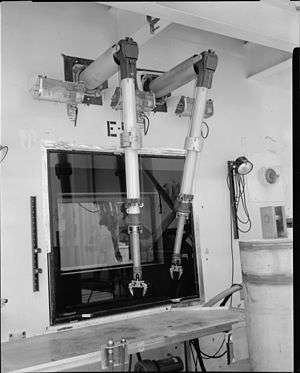Remote manipulator

A remote manipulator, also known as a telefactor, telemanipulator, or waldo (after the short story "Waldo" by Robert A. Heinlein which features a man who invents and uses such devices),[1] is a device which, through electronic, hydraulic, or mechanical linkages, allows a hand-like mechanism to be controlled by a human operator. The purpose of such a device is usually to move or manipulate hazardous materials for reasons of safety, similar to the operation and play of a claw crane game.
History
In 1945, the company Central Research Laboratories[2] was given the contract to develop a remote manipulator for the Argonne National Laboratory. The intent was to replace devices which manipulated highly radioactive materials from above a sealed chamber or hot cell, with a mechanism which operated through the side wall of the chamber, allowing a researcher to stand normally while working.
The result was the Master-Slave Manipulator Mk. 8, or MSM-8, which became the iconic remote manipulator[3] seen in newsreels and movies, such as the Andromeda Strain or THX 1138.
Robert A. Heinlein claimed a much earlier origin for remote manipulators.[4] He wrote that he got the idea for "waldos" after reading a 1918 article in Popular Mechanics about "a poor fellow afflicted with myasthenia gravis ... [who] devised complicated lever arrangements to enable him to use what little strength he had."
See also
References
- ↑ Technovelgy telemanipulator page
- ↑ CRL history
- ↑ Telemanipulator page
- ↑ Heinlein, Robert A. (1957), "Science fiction: its nature, faults and virtues", in Davenport, Basil, The Science Fiction Novel, Chicago: Advent (published 1959)
External links
| Look up waldo in Wiktionary, the free dictionary. |
| Wikimedia Commons has media related to Remote manipulators. |
- Central Research Laboratories web site
- A video of a Remote Manipulator being used to make an origami crane
- Master-slave manipulator at Argonne National Laboratory
- Zeleny, Milan (2005). Human systems management: Integrating Knowledge, Management. World Scientific. p. 142. ISBN 981-02-4913-6.